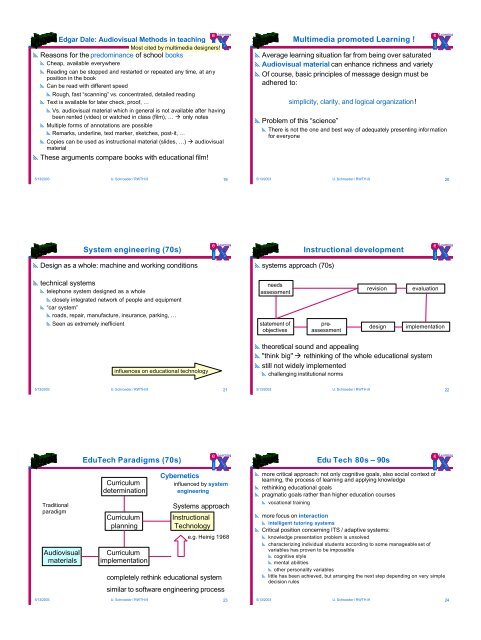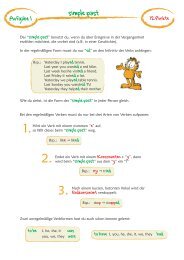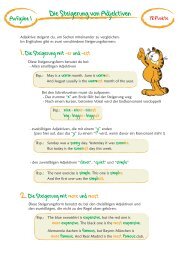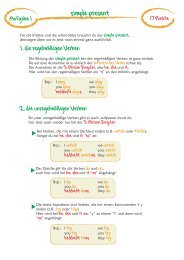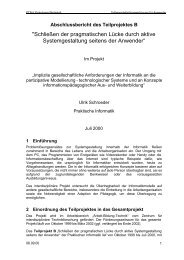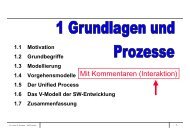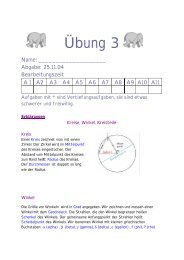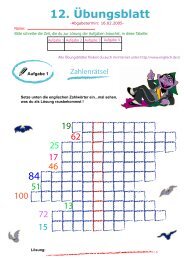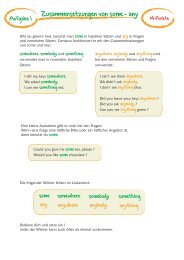Objectives / Topics History of Learning Machines History of ... - LuFG i9
Objectives / Topics History of Learning Machines History of ... - LuFG i9
Objectives / Topics History of Learning Machines History of ... - LuFG i9
Create successful ePaper yourself
Turn your PDF publications into a flip-book with our unique Google optimized e-Paper software.
e <strong>Learning</strong><br />
Edgar Dale: Audiovisual Methods in teaching<br />
Most cited by multimedia designers!<br />
yReasons for the predominance <strong>of</strong> school books<br />
yCheap, available everywhere<br />
yReading can be stopped and restarted or repeated any time, at any<br />
position in the book<br />
yCan be read with different speed<br />
yRough, fast “scanning” vs. concentrated, detailed reading<br />
yText is available for later check, pro<strong>of</strong>, …<br />
yVs. audiovisual material which in general is not available after having<br />
been rented (video) or watched in class (film), … only notes<br />
yMultiple forms <strong>of</strong> annotations are possible<br />
yRemarks, underline, text marker, sketches, post-it, …<br />
yCopies can be used as instructional material (slides, …) audiovisual<br />
material<br />
yThese arguments compare books with educational film!<br />
5/13/2003 U. Schroeder / RWTH <strong>i9</strong> 19<br />
System engineering (70s)<br />
yDesign as a whole: machine and working conditions<br />
ytechnical systems<br />
ytelephone system designed as a whole<br />
yclosely integrated network <strong>of</strong> people and equipment<br />
y“car system”<br />
yroads, repair, manufacture, insurance, parking, …<br />
ySeen as extremely inefficient<br />
5/13/2003 U. Schroeder / RWTH <strong>i9</strong> 21<br />
Traditional<br />
paradigm<br />
Audiovisual<br />
materials<br />
influences on educational technology<br />
EduTech Paradigms (70s)<br />
Curriculum<br />
determination<br />
Curriculum<br />
planning<br />
Curriculum<br />
implementation<br />
RWTH<br />
L u F G<br />
e <strong>Learning</strong><br />
RWTH<br />
L u F G<br />
e <strong>Learning</strong><br />
Cybernetics<br />
influenced by system<br />
engineering<br />
5/13/2003 U. Schroeder / RWTH <strong>i9</strong> 23<br />
RWTH<br />
L u F G<br />
Systems approach<br />
Instructional<br />
Technology<br />
e.g. Heinig 1968<br />
completely rethink educational system<br />
similar to s<strong>of</strong>tware engineering process<br />
Multimedia promoted <strong>Learning</strong> !<br />
yAverage learning situation far from being over saturated<br />
yAudiovisual material can enhance richness and variety<br />
yOf course, basic principles <strong>of</strong> message design must be<br />
adhered to:<br />
simplicity, clarity, and logical organization!<br />
e <strong>Learning</strong><br />
yProblem <strong>of</strong> this “science”<br />
yThere is not the one and best way <strong>of</strong> adequately presenting information<br />
for everyone<br />
5/13/2003 U. Schroeder / RWTH <strong>i9</strong> 20<br />
ysystems approach (70s)<br />
needs<br />
assessment<br />
statement <strong>of</strong><br />
objectives<br />
Instructional development<br />
preassessment<br />
revision<br />
5/13/2003 U. Schroeder / RWTH <strong>i9</strong> 22<br />
RWTH<br />
L u F G<br />
e <strong>Learning</strong><br />
design implementation<br />
RWTH<br />
evaluation<br />
ytheoretical sound and appealing<br />
y"think big" rethinking <strong>of</strong> the whole educational system<br />
ystill not widely implemented<br />
ychallenging institutional norms<br />
Edu Tech 80s – 90s<br />
y more critical approach: not only cognitive goals, also social context <strong>of</strong><br />
learning, the process <strong>of</strong> learning and applying knowledge<br />
y rethinking educational goals<br />
y pragmatic goals rather than higher education courses<br />
y vocational training<br />
5/13/2003 U. Schroeder / RWTH <strong>i9</strong> 24<br />
L u F G<br />
e <strong>Learning</strong><br />
y more focus on interaction<br />
y intelligent tutoring systems<br />
y Critical position concerning ITS / adaptive systems:<br />
y knowledge presentation problem is unsolved<br />
y characterizing individual students according to some manageable set <strong>of</strong><br />
variables has proven to be impossible<br />
y cognitive style<br />
y mental abilities<br />
y other personality variables<br />
y little has been achieved, but arranging the next step depending on very simple<br />
decision rules<br />
RWTH<br />
L u F G


